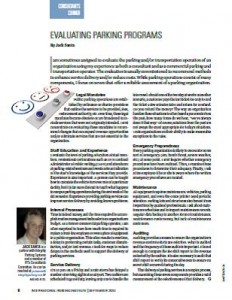I am sometimes assigned to evaluate the parking and/or transportation operation of an organization using my experience as both a consultant and as a commercial parking and transportation operator. The evaluation is usually commissioned to recommend methods to enhance service delivery and/or reduce costs. While parking operations consist of many components, I focus on seven that offer a reliable assessment of a parking organization.
Legal Mandates
Public parking operations are established by ordinance or charter provisions that outline the services to be provided, fees, enforcement authority, etc. Over time, these legal mandates become obsolete or are broadened to include services that were not originally intended. I first concentrate on evaluating these mandates to recommend changes that can expand revenue opportunities and/or eliminate services that are not essential to the organization.
Staff Education and Experience
I evaluate the level of parking education of staff members. Professional certifications such as IPI’s Certified Administrator of Public Parking (CAPP) and attendance at parking-related seminars and events offer an indication of the staff’s knowledge of the services they provide. Experience is also important. A person can be taught how to calculate the vehicle turnover rate of a particular facility, but it is far more difficult to teach what happens to campus parking operations during the first week of the fall semester. Experience providing parking services can improve service delivery by avoiding known problems.
Internal Processes
Time is indeed money, and the time required to accomplish routine management tasks affects an organization’s budget. As a former commercial parking operator, I am often surprised to learn how much time is required to replace a front-line employee or even a piece of equipment in a public organization. This often results in overtime, a delay in performing certain tasks, customer dissatisfaction, and/or lost revenue. I look for ways to reduce delays in the methods used to support the delivery of parking services.
Service Delivery
It’s 10 p.m. on a Friday and a rain storm has delayed a number of arriving flights at an airport. Two cashiers are scheduled to go off duty, leaving only one to handle the late crowd. Should one of the two stay at work? In another scenario, a customer pays the lost ticket fee only to find the ticket a few minutes later and return for a refund. Do you refund the money? The way an organization handles these situations is often based upon events from the past; how many times do we hear, “We’ve always done it that way.” Of course, solutions from the past are not aways the most appropriate for today’s situations. I rate organizations on their ability to make reasonable exceptions to the rules.
Emergency Preparedness
Every parking organization is likely to encounter some sort of emergency (fire, bomb threat, severe weather, etc.) at some point. I first inquire whether emergency procedures have been outlined. Then, I examine those procedures to determine their adequacy. Finally, I ask a line employee if he or she is aware where the written emergency procedures are located.
Maintenance
All equipment requires maintenance. Vehicles, parking equipment, and even the office printer need periodic attention. Parking lots and structures also benefit from inspections by qualified professionals. I ask about maintenance schedules and to inspect maintenance records. Regular data backup is another form of maintenance. Maintenance costs money, but lack of maintenance costs more.
Auditing
Auditing provides a means to ensure the organization’s revenue control efforts are effective. What is audited and the frequency of those audits is important. It is not enough to compare the fee shift report to the revenue collected by the cashier. It is also necessary to audit that shift report to verify its consecutiveness to ensure no secret shift occurred during the day.
That delivery of parking services is a complex process, but examining these seven components provides a valid measurement of the effectiveness of that delivery.
Jack Santa is a partner with Integrity Parking Systems and a member of IPI’s Consultants Committee. He can be reached at jacksanta@integrityparking.com or 440.543.4123.
TPP-2013-09-Evaluating Parking Programs

